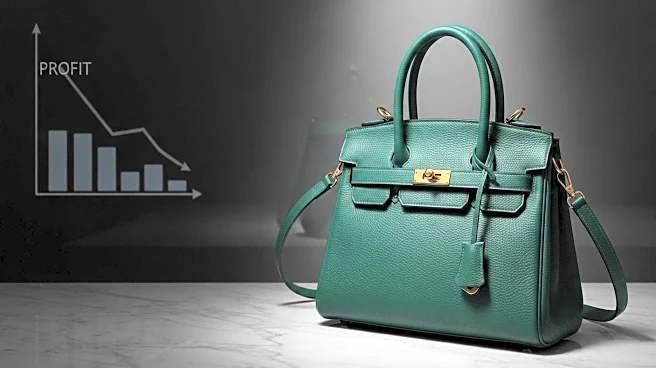What is the story about?
What's Happening?
Spanish luxury fashion brand Loewe, owned by LVMH, has reported a 9.17% increase in revenue for the 2024 financial year, reaching 885.2 million euros. Despite this growth, the company experienced a significant drop in net profit, which fell by 24.26% to 157 million euros compared to the previous year. This marks the end of Jonathan Anderson's tenure as creative director, who has left Loewe to join Dior. Loewe's physical retail business remains its primary income source, supplemented by wholesale operations and online sales. The brand saw notable growth in the U.S. market, with sales increasing by 31.2% to 85 million euros.
Why It's Important?
Loewe's financial results highlight the challenges luxury brands face in maintaining profitability amid revenue growth. The decline in net profit suggests increased operational costs or strategic investments that may not have immediately translated into higher earnings. The U.S. market's strong performance indicates potential for further expansion, which could be crucial for Loewe's future growth strategy. The change in creative leadership, with Jack McCollough and Lazaro Hernandez taking over, could bring fresh perspectives and innovation, potentially impacting the brand's design direction and market appeal.
What's Next?
With the appointment of new creative directors Jack McCollough and Lazaro Hernandez, Loewe is poised for a strategic relaunch. Their debut at Paris Fashion Week will be closely watched by industry stakeholders and could influence Loewe's brand positioning and consumer engagement. The U.S. market's growth suggests Loewe may focus on expanding its presence there, potentially through increased marketing efforts or new store openings. The brand's ability to balance creative innovation with financial performance will be critical in navigating the competitive luxury fashion landscape.
Beyond the Headlines
The transition in creative leadership at Loewe could signal broader shifts in the luxury fashion industry, where brands are increasingly seeking to blend traditional craftsmanship with modern design sensibilities. This change may also reflect LVMH's strategic approach to maintaining its portfolio's relevance and appeal in diverse markets. The emphasis on U.S. market growth underscores the region's importance as a key driver for luxury sales, potentially influencing other brands to enhance their focus on American consumers.















